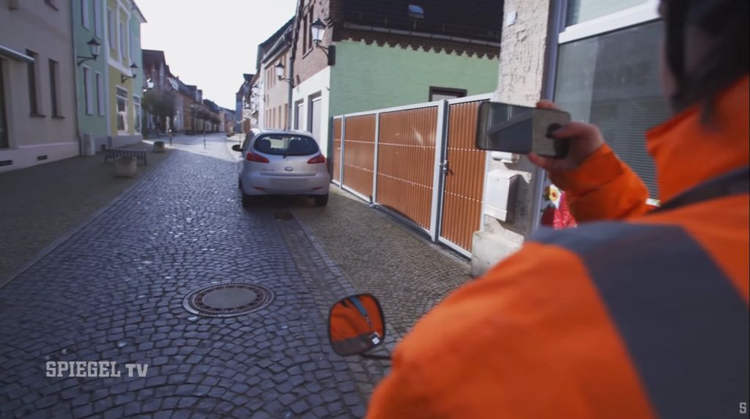Hospital Nurse Secretely Sedates Sick Patients to Make His Nightshifts Easier

A palliative care nurse in Germany has been convicted of killing at least 10 people by secretly injecting them with painkillers and sedatives to lower his nightshift workload
Woman Caught Transporting Pony in Back Seat of Car Refuses to Pay Fine

A German woman caught by police transporting a Shetland pony in the back seat of her pink car refused to pay a €35 ($41) fine and now faces administrative proceedings. Earlier this month, police in Alsdorf, near Aachen, Germany, pulled over a suspicious pink car after seeing something strange through the rear window. Upon popping […]
Teacher on Sick Leave for 16 Years Sues Employer For Asking Her to Prove Her Illness

A German teacher who has been on sick leave since 2009, while receiving a full salary, has sued her employer after being asked to undergo a medical examination to confirm her condition. An unnamed teacher from Germany’s North Rhine-Westphalia has sued her employer after it began to challenge her unusually long absence from the workplace […]
Male-Born German Extremist Officially Changes Gender to Serve Time in Women’s Prison

Taking advantage of Germany’s “gender self-determination” reforms, a male right-wing extremist officially changed his gender to female and will serve time in a women’s prison. In July of 2023, Marla-Svenja Liebich was sentenced by the Halle District Court in Germany’s Saxon-Anhalt state to a year and six months without parole for incitement to hatred, defamation, […]
Car Abandoned at Airport for a Year Racks Up Over $200,000 in Parking Fees

A VW Golf abandoned in the short-term parking area of a Berlin airport for a whole year has made international news headlines after racking up a whopping 201,480 euros ($209,124) in parking fees. Airport parking fees are notoriously high, and Berlin’s Brandenburg Airport is no exception. The first ten minutes in the facility’s short-term parking […]
German Teenager Snitches on Parking Offenders as a Hobby

18-year-old Niclas Matthei has become known as the “Reporting Master” in his home country of Germany after snitching on thousands of parking offenders to the police. Not all heroes wear capes! Some wear neon green overalls and ride bicycles around busy streets hunting parking offenders and snitching on them to the police as a hobby, […]
Museum Employee Secretely Hangs His Own Artworks Next to Priceless Classics

An employee of the Pinakothek der Moderne art museum in Munich, Germany, reportedly hung up his own paintings next to works by Pablo Picasso or Franz Marc without asking anyone for permission. The 51-year-old unnamed man was reportedly working in the museum technical department, which gave him access to the premises outside of visiting hours. […]
German Teenager Left Parents’ Home to Live Exclusively on Trains for the Last Year and a Half

A 17-year-old German teen has been living life as a modern nomad, leaving his parents’ house to live on trains and travel all over his country. While most 17-year-olds are only just beginning to consider the idea of leaving the nest, Lasse Stolley has already been on his own for over a year and a […]
Scientists Baffled by Man Who Got Vaccinated for Covid-19 a Whopping 217 Times

A team of German scientists studied a 62-year-old man who deliberately got 217 Covid-19 vaccine shots over 29 months and found that he suffered from no negative vaccine-related side effects. Many people wouldn’t get a shot of Covid-19 vaccine if their lives depended on it, but a German man decided to compensate for many of […]
World’s Most Frugal Millionaire Rummages Through Trash Cans for Food

An 80-year-old German man has been dubbed the world’s most frugal millionaire for living off food and stuff found in dumpsters despite owning several properties worth millions of euros. Heinz B. looks like a homeless person with nothing to his name, but appearances can be deceiving. The German man may only have €15 euros ($16) […]
Museum Employee Swaps Paintings With Fakes, Sells Originals at Auction

A German museum employee was recently arrested for reportedly swapping several paintings with fake copies and selling the originals to fund a lavish lifestyle. Due to Germany’s strict privacy laws, the identity of the 30-year-old former employee of the Deutsches Museum in Munich has not been disclosed to the public, but it has been reported […]
Dresden’s Massive Tobacco Mosque – A Story of Deception

The German city of Dresden is famous for the Baroque architecture that runs along the banks of the Elbe River, but there is one exception that stands out like a sore thumb – the iconic Yenidze building, aka the ‘tobacco mosque’. Featuring clear oriental architectural elements of mosques and the famous Alhambra Palace of Granada, […]
Ottomeyer Mammut – The Story of the World’s Largest Plow

The Ottomeyer Mammut is the largest plow ever made. It was created for the specific purpose of converting bogs into agricultural land and could cut channels in the ground to a depth of over 2 meters. The bog areas of the Emsland district in Northern Germany, on the border with the Netherlands, had been determined […]
German Brewery Claims Its Beer in Powder Form Could Change Industry Forever

Neuzeller Klosterbräu, a brewery in eastern Germany, claims to have devised a way to create a powdered beer that, when mixed with water, tasted almost exactly like the original liquid beverage. The global beer industry is massive, but it’s also one of the least efficient in the world. Transporting large quantities of beer bottled in […]
Monte Kali – The World’s Largest Artificial Salt Mountain

The town of Herringen, in central Germany, is home to a heap of sodium chloride (table salt) so massive that it has come to be known as Monte Kali. It is the world’s largest artificial salt mountain. The origin of Monte Kali can be traced back to the year 1976, when potash salt started being […]
